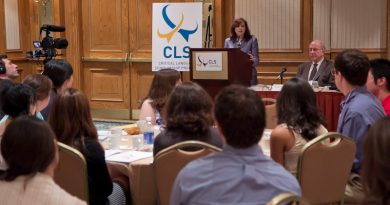NYASA Conference at Seton Hall
Andrew Wilson
Staff Writer
During the weekend of April 13, the New York Africana Studies Association (NYASA) hosted its 43rd annual conference with the School of Diplomacy & International Relations. A non-profit organization founded in 1967, NYASA comprises Africanists who are faculty members at colleges and universities, and other researchers, professionals, and students.
Per the NYASA website statement, the organization promotes the visibility and advancement of the discipline of Africana studies in New York State and surrounding areas, and offers opportunities for the scholarly and professional development of educators, and enhanced education for community members, leaders, and activists.
Held on Seton Hall’s campus, the conference consisted of presentations from merited professors across the tristate area and welcomed many international panelists. Topics of discussion ranged from neo-colonialism, human trafficking, refugees and migration, social change, religion, governance, literature, media, diplomacy, and many more.
During a panel on diplomacy and migration, Alexander Miller, a Seton Hall graduate student, presented his study on the conflict and repatriation efforts of the Mozambican civil war and the implications for the current South Sudanese war and refugee resettlement crisis. During his presentation, James noted the importance of human accessibility to neighboring states in the eventual repatriation process.
In Mozambique’s situation, human accessibility to Malawi had a positive effect on repatriation. This can be seen in today in accordance with Uganda’s ongoing open migrant policy toward South Sudan. According to UNHCR, over one million registered South Sudanese refugees have arrived in Uganda since the civil war began in 2013.
Stephanie Miller, a Seton Hall undergraduate student, presented on the role of human trafficking on migration in Africa. Overall, she stated that the current crisis is caused by increased conflict and economic displacement accompanied by globalization.
Using Nigeria as a case study for conflict and migration, she cited that terrorist groups, as well as the Nigerian government’s counter insurgency efforts to quell these terror operations, have displaced over half a million people.
In an interview after her presentation, she cited the ease with which refugee smugglers can involve themselves in the more profitable business of human trafficking, and the even more lucrative operation of transnational crime syndicates.
Why would a refugee smuggler transport a Somalian child to Italy for a small return when they could be sold to Boko Haram as a child soldier for a much higher profit? This situation has led increasing numbers of human traffickers to masquerade as refugee smugglers in sensitive regions like West Africa.
Later, Ibipo Johnston-Aunumonwo of SUNY Cortland presented an analysis of transnational African migrants’ experiences. Focusing on individual experiences, she highlighted the underlying stigmatization that surrounds them as dark skinned migrants. Bordering on complete rejection in some European geographic regions, this makes it near impossible for them to gain employment and integrate into society, not to mention the compounding of this marginalization for female migrants.
Also during the diplomacy panel, Selam Woldergerima, another undergraduate student at Seton Hall presented on the changing nature of African identity. An international student originally from Ethiopia, Selam highlighted the idea that most Africans have a strong affiliation to their home country, but lack a positive sense of African unity.
After the presentation, Professor M.M. Fadakinte of the University of Lagos in Nigeria commented on the fracturing of pan-Africanism, stating that Africans must first identify where their true affiliation lies —possibly beyond state borders — and then work to improve this newfound association. He cited the independence of Eritrea and subsequent state building as an example. Professor Douglas Thomas of SUNY Brockport expanded on this idea, saying, “We can understand each other as associated to our individual country, but it is the job of Africa as a whole to build itself up.”

